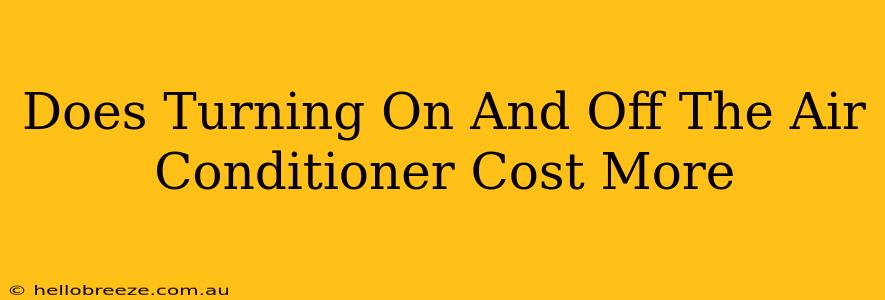Does Turning Your Air Conditioner On and Off Cost More? The Surprising Truth
The age-old question: is it cheaper to leave your air conditioner running constantly, or to turn it on and off throughout the day? The answer isn't as simple as a yes or no. It depends on several factors, and understanding them can save you money on your energy bill.
The Myth of Cycling Costs:
Many believe that constantly turning your AC on and off (cycling) puts extra strain on the system, leading to higher electricity consumption. While it's true that starting up an AC unit requires a surge of power, the extent to which this impacts your bill is often overstated. Modern AC units are designed to handle this, and the increased energy use during startup is usually minimal compared to the overall runtime.
Factors that Influence Energy Consumption:
Several crucial elements influence whether cycling your AC will cost you more:
1. Your Air Conditioner's Efficiency:
- SEER Rating: The Seasonal Energy Efficiency Ratio (SEER) is a key indicator. Higher SEER ratings (15 or above is generally considered efficient) mean the unit uses less energy to achieve the same cooling effect. More efficient units are less impacted by cycling.
- Age of Your Unit: Older AC units tend to be less efficient and may show a greater increase in energy consumption with frequent cycling.
2. Your Home's Insulation and Sealing:**
- Heat Gain: Poor insulation and air leaks let in hot air, forcing your AC to work harder – whether it's constantly running or cycling. A well-insulated home will minimize the impact of cycling.
- Proper Sealing: Seal gaps around windows and doors to prevent heat from entering and cool air from escaping. This is crucial regardless of whether you cycle your AC or keep it running.
3. Your Thermostat's Programming:**
- Smart Thermostats: Programmable or smart thermostats allow for precise temperature control and can optimize your AC's runtime, minimizing energy waste even when cycling. These often have features that learn your habits and adjust accordingly.
- Manual Cycling: If you're manually turning your AC on and off, you're likely less efficient than a programmable thermostat.
4. Ambient Temperature and Humidity:**
- Extreme Heat: In extremely hot and humid conditions, cycling your AC might lead to higher energy use because the unit has to work harder to cool the space down again after it's been turned off.
- Moderate Climate: In moderate climates, the impact of cycling might be less significant.
When Cycling Might Be More Expensive:
- Old, inefficient AC units: As mentioned, these units are more likely to show a noticeable increase in energy use when cycling.
- Poorly insulated homes: The constant battle against heat gain will lead to more energy consumption, regardless of whether you cycle.
- Extreme weather: During heatwaves, cycling might cause a significant increase in energy use.
When Cycling Might Save You Money:
- Efficient AC units (high SEER rating): The minimal startup surge is negligible compared to the energy savings from not running the AC continuously when you're away or asleep.
- Well-insulated home: Minimizes heat gain and reduces the overall energy demand, making cycling less impactful.
- Smart thermostat usage: Optimizes runtime and reduces energy waste.
The Bottom Line:
There's no definitive answer to whether cycling your AC costs more. It's a complex issue that depends on several factors. Improving your home's insulation and using a smart thermostat will make the impact of cycling significantly less. For optimal energy savings, consider upgrading to a high-SEER AC unit and improving your home’s energy efficiency. This will result in lower overall energy usage regardless of your AC cycling habits.

